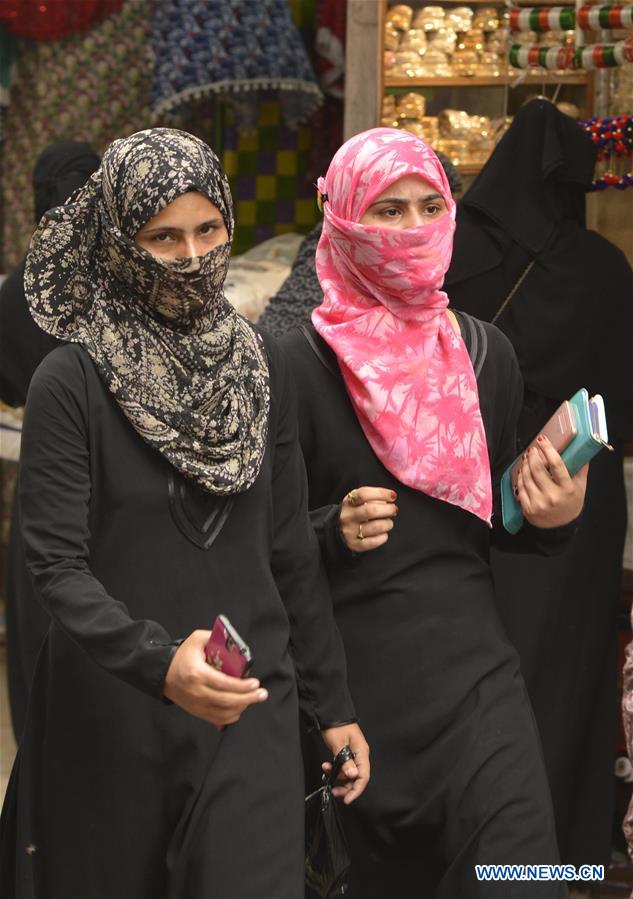
Muslim women are seen on street near Jama Masjid, New Delhi, India, Aug. 22, 2017. India's Supreme Court on Tuesday banned the practice of Islamic instant divorce locally called Triple Talaq, after describing it as unconstitutional and "un-Islamic." (Xinhua/Stringer)
NEW DELHI, Aug. 22 (Xinhua) -- India's top court on Tuesday banned the practice of Islamic instant divorce locally called Triple Talaq, after describing it as unconstitutional and "un-Islamic."
Triple Talaq, forms a practice where a Muslim man was authorized to divorce his wife by uttering the word "Talaq" (divorce) thrice.
The landmark court decision came in response to petitions filled by five Muslim women who had been divorced in this way. Two rights groups had also petitioned in the apex court seeking an end of the custom.
The verdict was delivered by a constitutional bench comprising of five top judges from different major faiths -- Hinduism, Christianity, Islam, Sikhism and Zoroastrianism.
The bench delivered a spilt verdict of 3-2 invalidating the practice as part of the Muslim Personal Law.
"Three of the five judges hearing the case said it is unconstitutional, while as the other two wanted it banned for six months till the government introduces new legislation," a lawyer present in the court said. The majority opinion held that Triple Talaq "is not integral to religious practice and violates constitutional morality."
Women's rights activists and victims have hailed the court's decision as a historic win.
There have been cases in which Muslim men in India have divorced their wives by issuing the Triple Talaq by letter, telephone and SMS (text message on mobile phones), WhatsApp and Skype.
"They say a marriage is solemnized with the agreement of both the parties husband and wife but how come husband can divorce the wife arbitrarily without even consulting wife," said Atiya Sabri, whose husband has divorced her by sending a letter to her on the office address of his brother.
"I don't consider it divorce the way my husband abandoned me," Sabri said.
The top court began to hear the petitions challenging Triple Talaq in May after clubbing seven petitions challenging the practice.
Muslims religious groups in India oppose the court's decision and view it as the interference in their religion.
The Muslim community leaders said these practices have religious basis and were not justiciable.
"The practice is an issue of faith and personal law, and the courts of law have no role in reviewing it," said Mufti Israr Ahmad, a Muslim scholar. "If there is a need to bring an amendment in it, let the Muslim scholars sit and decide."
Women activists have long been opposing the practice describing it "discriminatory" and "injustice."
Over 20 Muslim countries including neighboring Pakistan and Bangladesh have abolished Triple Talaq.
Muslim women in India for long have been demanding a ban on the practice of Triple Talaq.
"Hundreds of women especially from poor backgrounds have fallen prey to this illogical practice and are abandoned by their husbands," Shazia Hassan, a women activist said. "By uttering the word Talaq thrice, many women have been rendered destitute as their husbands feel their responsibility to take care of them ceases after that."
Muslims in India with a population of about 155 million are the largest minority community. Their marriages, customs and the issues related to it are exclusively governed by the Muslim Personal law, commonly referred to as Islamic law or Sharia.















